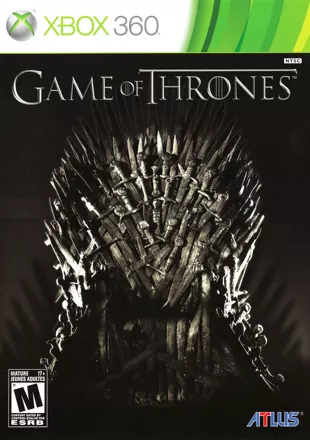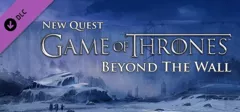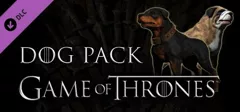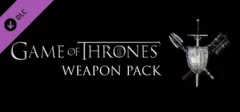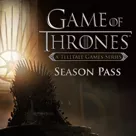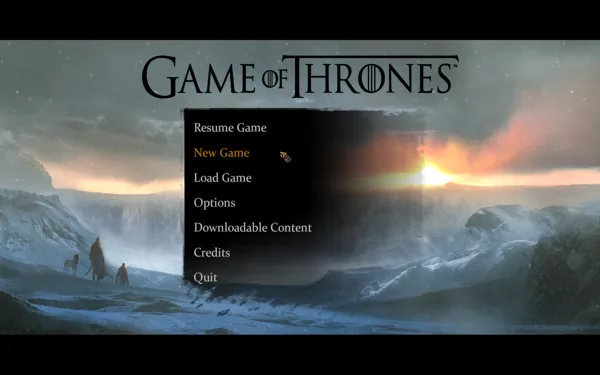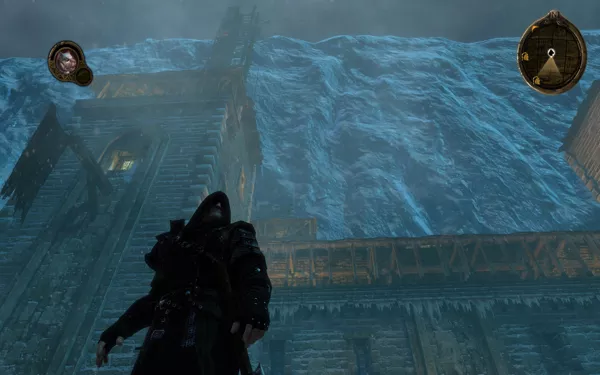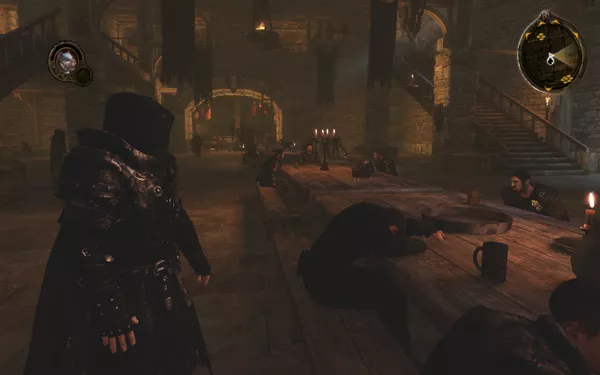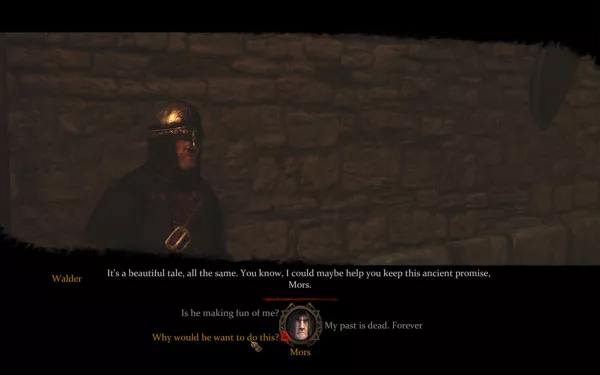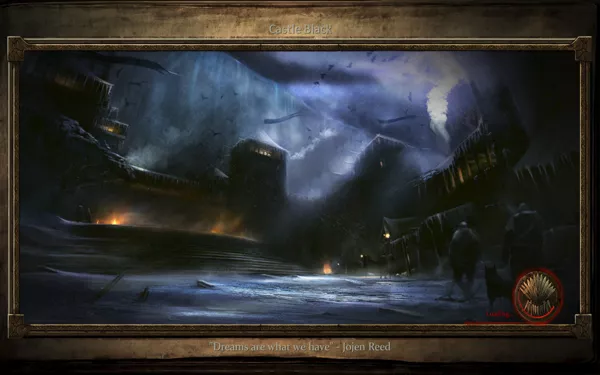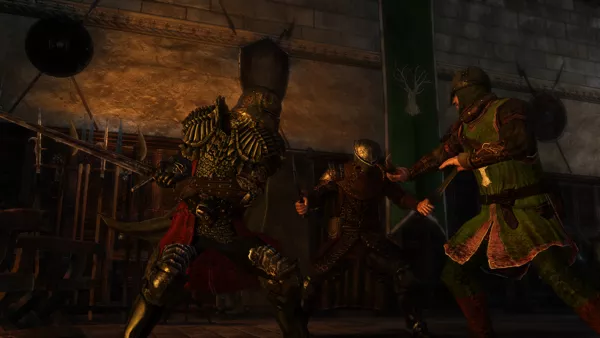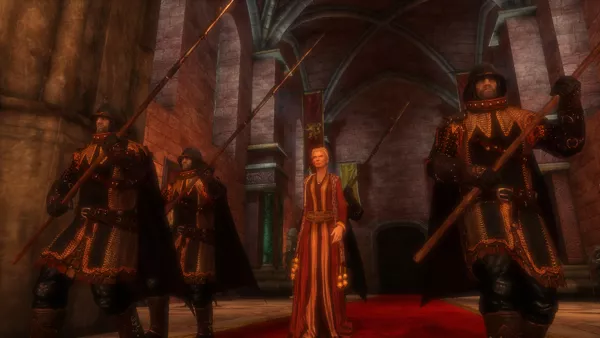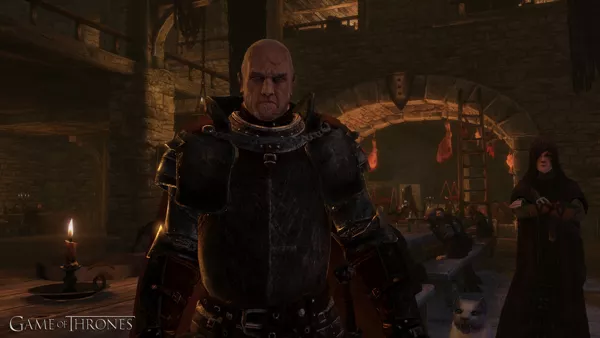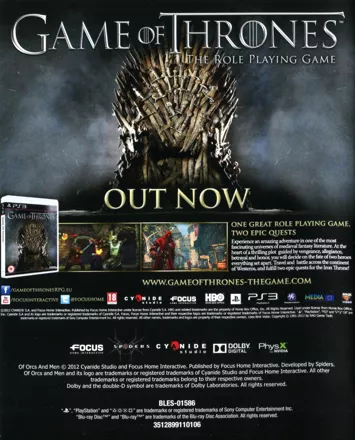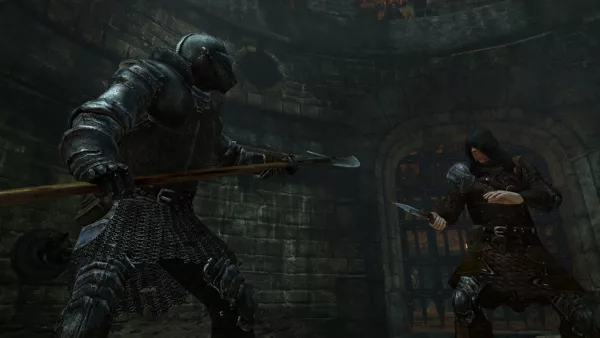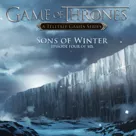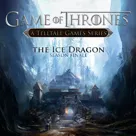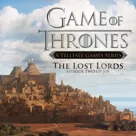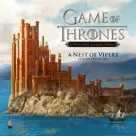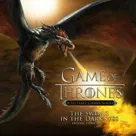Game of Thrones
Description
Game of Thrones is a role-playing game based on the A Song of Ice and Fire novels by George R.R. Martin and visually inspired by the HBO TV series adaptation that debuted in 2011. For the latter it uses the theme music, a number of voice actors and many recognizable elements in the scenery. The events and the setting of the game are inspired by the first book, A Game of Thrones. Instead of following the main storyline from the book and the TV series, the plot is set in parallel to it and does not overlap. As such, the struggle between the House Stark and the Lannister clan is only a reference in the game, but many locations and characters are shared.
The game is set on the continent Westeros, home of the Realm of the Seven Kingdoms. After the Targaryen line of kings ruled it for a long time, they were overthrown by a rebellion led by Robert Baratheon, who unified the lords and became the one to rule from the Iron Throne as lord of the Seven Kingdoms. The player gets to control two different characters in separate, alternating chapters. The first is Mors Westford, a member of the Night's Watch who guards the wall dividing the continent. From Castle Black, they keep back the creatures beyond. The second character is Alester Sarwyck, a priest of R'hllor who becomes involved with the politics of court. He is only introduced in the second chapter and during the course of the game their stories intertwine.
Starting with Mors Westford, the player is able to customize both characters through a number of parameters. The first part is the combat style. Mors gets to choose between landed knight, hedge knight or magnar, while Alester has access to water dancer, sellsword, or archer. Next the player gets to distribute points between the abilities strength, agility, luck, endurance, and intelligence. Further abilities are defined through stance points with a skill tree, and a fourth step involves skill points for certain types of weapons and armour. Finally, character traits are determined through a list of strengths and weaknesses. These include for instance born leader, leech and acrobat as strengths, and witless, clumsy and allergic as weaknesses.
The game world consists of several locations marked on a map and cannot be explored freely unless corresponding quests are triggered. New areas on the world map are only opened up gradually and the story along with its quests are largely linear. The game contains typical RPG gameplay elements with primary and secondary quests, fighting opponents to complete quests and collect loot, and buying items at shopkeepers and blacksmiths to equip the character with weapons, flasks and armour. Dialogues with characters allow choices of responses that in some cases may affect plot events, but offer no conversation topics to discuss. Cutscenes are triggered automatically during certain parts of the game. Characters level up through experience points and get access to new abilities.
Combat is done in real-time, with a system reminiscent of Dragon Age: Origins. The characters do not need to be moved around to engage or dodge, and weapons are not controlled manually. Instead the player determines the actions through an action queue where different attacks, stances and abilities can be equipped and these are then performed automatically. At any moment, it is possible to "pause" the game where the gameplay is slowed down significantly, making room to re-arrange the queue with new attacks and abilities. Companions join and leave as dictated by the plot, and the player is unable to choose them and manage the party throughout the course of the game. It is possible to change to a team mate and control them directly in battles, guiding the entire party one member at a time with different attacks, cycling through targets, etc.
Spellings
- Игра Престолов - Russian spelling
Groups +
Screenshots
Promos
Videos
Add Trailer or Gameplay Video +1 point
See any errors or missing info for this game?
You can submit a correction, contribute trivia, add to a game group, add a related site or alternate title.
Credits (Windows version)
311 People (283 developers, 28 thanks) · View all
| Executive Producer | |
| Project Manager | |
| Special Thanks | |
| Select tracks based on Game Of Thrones themes written by | |
| Lead Game Designer | |
| Game Designer Dialogue / Cinematic | |
| Game Designer Gameplay | |
| Game Designer Combat | |
| Additional Game Design | |
| Quest Designers | |
| Additional Quest Designer | |
| Lead Writers | |
| Additional Writers | |
| Lead Level Designer | |
| Level Designers | |
| [ full credits ] | |
Reviews
Critics
Average score: 60% (based on 24 ratings)
Players
Average score: 3.3 out of 5 (based on 17 ratings with 1 reviews)
I can see the thrones, but where is the game?
The Good
For the record, I haven't watched the TV series or read the books this game is based on, so my review focuses purely on its merits as a game. Game of Thrones represents, at least on the surface, an old school of RPG design as consolidated by BioWare, and resembles Dragon Age II in basic mechanics. It is a "hands-off" real-time-with-pause RPG focusing primarily on story. Once upon a time such RPGs shined in gameplay and were at the forefront of the genre. Those times are long gone, and Game of Thrones would come across as archaic even if it were a better game. Still, the system has a certain old-style appeal, and there are some interesting elements in character-building, such as strengths and weaknesses you have to assign to your protagonists during character creation.
The game's most valuable asset is its setting, more specifically the historical-political background to it. Unlike the vast majority of medieval fantasy games, this setting is almost entirely "medieval", with the "fantasy" part limited to a few very sporadic supernatural phenomena. It was certainly a bold attempt to create a fairly realistic scenario where there are no monsters or magic and where all your opponents are human beings. You are given control of two interesting protagonists with their own agendas that, for a change, have nothing to do with fulfilling ancient prophecies or fighting evil demons. There is gritty realism in this setting, or at least it's implied, since the game does little to adequately reflect it in its visuals.
Your interest in the game will be most likely sustained by its story. Indeed, Game of Thrones has one of the better video game plots in recent memory, notable mostly for its complexity and focus on serious themes such as loyalty, responsibility for one's actions, redemption, and so on. Mind you, it's nothing truly mind-boggling, and much of it is ruined by the game's presentation, but it's nice to have a plot that doesn't involve saving the world from time to time. Some instances present meaningful choices, where you actually get to shape the moral face of your protagonist, though these are few and far between. There are some potentially powerful moments, and overall this story certainly deserves a better game with a better direction to be wrapped around.
The Bad
Game of Thrones is a weak attempt to recreate the glory of a once powerful and prosperous genre. Unfortunately, it utterly fails to convey the depth and the complexity of the great RPGs of the past. First of all, it's an absolutely "hands-off" RPG, totally devoid of physical interaction or anything else that would benefit from a three-dimensional world. But let's suppose for a second that it was deliberately made so, and compare it to similar games such as the Dragon Age franchise. Those games were also antiquated in their persistence to ignore the vast physical possibilities of 3D. But at least they went all the way with character interaction. The whole point of playing such games is enjoying the intricacies of personal relationships and building a party you can be attached to.
The big problem here is that, for an inexplicable reason, Game of Thrones neglects any party-building and teams up both of your cycling main protagonists with unimportant people who join for a quest or two and then depart without leaving any impact. In a nearly Final Fantasy XIII-like infuriating fashion, the game keeps forcing you to play as whatever character it assigns to lead a chapter with, switching protagonists and their nearly non-existent companions whenever it wants to and never allowing you to manage anything on your own. This results in a very specific kind of boredom that plagues games like Neverwinter Nights, where you have to endure dragging real-time-with-pause battles while essentially controlling only one character. Not only there is no attachment of any kind to the briefly joining party members, but the lack of cohesive player-dictated character growth and coordination in party-building ruins the game's role-playing aspect.
NPC interaction is very limited as well. There are no actual dialogue topics: every conversation is basically set on "auto", and all you can do is select a response. Most of these responses are purely cosmetic choices and do not affect the plot in any way. There are no relationships to build up, and generally nothing interesting to get from the characters, including those who occasionally join the main heroes. There are some side quests, but most of them aren't very exciting or well-integrated into the main story.
The game has poor level design, with artificial, formulaic locations that make the narrow passages of Dragon Age II look like sprawling areas open for exploration. True, they are less copy-pasted, and there are some nice visual details here and there, but overall there is no sense of discovery, wonder, or adventure. Most of the game consists of repeatedly visiting the same towns and running through them from spot to spot to trigger the next event. There are hardly any actual hostile, dungeon-like areas, and you can forget about any sort of exploration: the game is aggravatingly linear. The world map is tiny and consists of a bunch of icons that directly lead to wherever you want to travel to, and all the areas are small and consist only of the bare necessities.
I think Game of Thrones could have been much better if it were an open-world action RPG like Skyrim. The rich setting of the source material begs to be translated into a large, explorable world. Unfortunately, in this game you can only see glimpses of that world, a few locations hastily tied together, without any sense of scope or cohesion. The gritty nature of the original narrative would also fit action-oriented combat much better, regardless of the fact that the game does a bad job at implementing party-based mechanics anyway. That way, lack of magic and fantasy would have been compensated by physical connection and immersion in the world, resulting in a much more realistic and convincing medieval experience. As it is, the almost complete absence of the supernatural reduces battles to unspectacular exchanges of semi-controlled blows and status effects.
The game's only really strong side, its story, is sadly undermined by lackluster presentation. The graphics are outdated and sorely lack warmth, animation is stiff and wooden, and voice acting is uniformly unimpressive. For a game that aims to convert a dramatic series into a video game format, this borders on inexcusable. The game lives and dies with its story, but presents it without drama or any cinematic quality whatsoever, be it camera work, direction, acting, music, sound effects, or anything else. You simply don't feel any attachment to anything that goes on. The low-budget, nearly amateurish presentation damages the game that could have been redeemed if it had at least delivered entertaining non-interactive elements, all the while failing in playability.
The Bottom Line
No matter how interesting its source material may be and how much it tries to tell a good story, Game of Thrones fails to excite or stimulate the player in any way. It would be a hard task to revive the dying sub-genre of RPGs it represents, but if the game's designers were aiming for that they should have studied the classics more thoroughly. Shallow and paper-thin even compared to BioWare's recent products, and completely lacking their dramatic impact, Game of Thrones is a pale shadow of past glory that evokes sadness and longing for better days.
Windows · by Unicorn Lynx (181621) · 2013
Analytics
Related Sites +
-
Wikipedia: Game of Thrones
Article about the game in the open encyclopedia -
gameofthrones-rpg.com
official game website
Identifiers +
Contribute
Are you familiar with this game? Help document and preserve this entry in video game history! If your contribution is approved, you will earn points and be credited as a contributor.
Contributors to this Entry
Game added by Sciere.
Additional contributors: Jeanne, JRK, katarn_88, Kennyannydenny.
Game added June 8, 2012. Last modified January 6, 2025.


